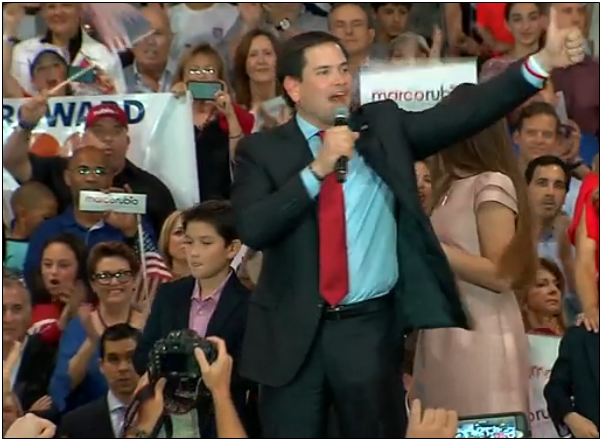Sen. Marco Rubio (R-Fla.) is warning Republicans not to talk about Wikileaks — even though its latest revelations have revealed high corruption by Hillary Clinton and the Justice Department in covering up her illegal private email server that was storing classified information, and then destroyed emails even after being served with a Congressional subpoena.
“Today it is the Democrats. Tomorrow, it could be us,” Rubio said, adding, “I will not discuss any issue that has become public solely on the basis of Wikileaks. As our intelligence agencies have said, these leaks are an effort by a foreign government to interfere with our electoral process, and I will not indulge in it.”
But, don’t the American people have an interest in knowing about the corruption that is being exposed? Does it really matter if the latest batches of email were obtained illegally, via hacks or espionage? How do we know some of them weren’t leaks from inside the Clinton campaign itself?
Sometimes, the disclosures and the information they contain are more important than how they were obtained, and reporting on them is protected by the First Amendment. And Rubio knows it.
In January, when conservative activists David Daleiden and Sandra Merritt were charged by a grand jury after releasing undercover video of Planned Parenthood employees discussing the illegal sale of baby body parts, Rubio stood up for the activists, telling CNN: “I’m disturbed. We’ll need to learn more, but I’m disturbed that while Planned Parenthood, who are the ones that were actually selling off these (body) parts were found having done nothing wrong, the people who tried to expose them are the ones that are now facing criminal charges.”
Then, Rubio thought charges should have been brought against Planned Parenthood, not the activists who exposed the wrongdoing via investigative journalism.
Ultimately, Rubio’s gut instinct was vindicated in July when the case against Daleiden and Merritt was dismissed. As it should have been. Investigative journalism, exposing wrongdoing by corrupt officials and businesses, is a part of the freedom of the press. It’s protected by the First Amendment.
Elsewhere, in 2014 Rubio proposed legislation that would protect whistleblowers who reported wrongdoing by the Department of Veterans Affairs (VA), saying in a statement, “This new legislation will leave the VA secretary with no excuse but to hold those responsible for the dysfunction and incompetence plaguing our VA system accountable for their actions while protecting whistleblowers from retaliation.”
So, what if Wikileaks suddenly started reporting on more wrongdoing by the VA? What if the information had been hacked or obtained through other means illegally? Would it matter? Would he shirk his oversight duties as a Senator, or would he investigate?
The truth is, the public has no way of actually knowing how Wikileaks obtains information or if it is even personally responsible for developing the sources, or if it simply receives that information and reports on it. In that sense, how is Wikileaks all that different from a news reporter that receives classified information?
Like, say, Fox News’ James Rosen? In 2013, when the Justice Department was charging Rosen with a crime for publishing a story that contained classified information, Rubio was at the front of the line defending Rosen’s right to publish, saying, he was “very concerned” about “possible criminal prosecution for doing what appears to be normal news-gathering protected by the First Amendment.”
Nice double standard there. Fox can publish, but not Wikileaks? What difference does it make?
Rubio went on in his statement on Rosen, saying that the leakers should be prosecuted, “The sort of reporting by James Rosen detailed in the report is the same sort of reporting that helped Mr. Rosen aggressively pursue questions about the Administration’s handling of Benghazi. National security leaks are criminal and put American lives on the line, and federal prosecutors should, of course, vigorously investigate. But we expect that they do so within the bounds of the law, and that the investigations focus on the leakers within the government — not on media organizations that have First Amendment protections and serve vital function in our democracy.”
So, for Rubio, when it comes to classified information, leakers and wrongdoing should be given no harbor, even if it exposes wrongdoing by the administration. But, reporters that receive the classified information still have a right to publish.
In the meantime, many of the disclosures now being revealed by Wikileaks are not even classified information. They are against private campaign officials like Clinton campaign chairman John Podesta. Or against government officials such as State Department officials discussing which emails to delete from Clinton’s server — all to avert a Congressional subpoena.
So, even when Wikileaks publishes information showing government officials violating a Congressional subpoena, engaging in obstruction of justice and destroying evidence, Rubio thinks Congress should just ignore it because Wikileaks published it? That’s nuts. Because “Tomorrow, it could be us”?
Here’s an idea: Don’t destroy evidence under Congressional subpoena, and Republicans won’t have that problem.
In another example, Wikileaks is now publishing information that corroborates Democratic National Committee (DNC) involvement in disrupting Donald Trump rallies and inciting violence that was exposed by James O’Keefe in an investigative journalism video. But we suppose we need to ignore that, too, even though it certainly exposes more wrongdoing against not only the Republican nominee, but our free and fair elections, too.
What if Fox News’ James Rosen had published these stories and not Wikileaks? Would Rubio then look into Clinton’s apparent obstruction of justice? Or would he care about exposing the DNC’s crimes against our Republican activists coming out with their families to greet and cheer on Donald Trump?
You can’t have it both ways. You don’t get to choose which speech is protected and which is not. If politicians are scared of Wikileaks, maybe they should be. Perhaps it’s about time corrupt politicians were exposed for the criminals they are. The truth will out, Senator.
Robert Romano is the senior editor of Americans for Limited Government.







